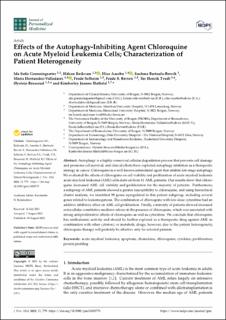| dc.contributor.author | Grønningsæter, Ida Sofie | |
| dc.contributor.author | Reikvam, Håkon | |
| dc.contributor.author | Aasebø, Elise | |
| dc.contributor.author | Bartaula-Brevik, Sushma | |
| dc.contributor.author | Hernandez‐valladares, Maria | |
| dc.contributor.author | Selheim, Frode | |
| dc.contributor.author | Berven, Frode Steingrimsen | |
| dc.contributor.author | Tvedt, Tor Henrik | |
| dc.contributor.author | Bruserud, Øystein | |
| dc.contributor.author | Hatfield, Kimberley Joanne | |
| dc.date.accessioned | 2022-04-06T11:10:04Z | |
| dc.date.available | 2022-04-06T11:10:04Z | |
| dc.date.created | 2021-09-01T13:08:07Z | |
| dc.date.issued | 2021 | |
| dc.identifier.uri | https://hdl.handle.net/11250/2990183 | |
| dc.description.abstract | Autophagy is a highly conserved cellular degradation process that prevents cell damage and promotes cell survival, and clinical efforts have exploited autophagy inhibition as a therapeutic strategy in cancer. Chloroquine is a well-known antimalarial agent that inhibits late-stage autophagy. We evaluated the effects of chloroquine on cell viability and proliferation of acute myeloid leukemia acute myeloid leukemia (AML) cells derived from 81 AML patients. Our results show that chloroquine decreased AML cell viability and proliferation for the majority of patients. Furthermore, a subgroup of AML patients showed a greater susceptibility to chloroquine, and using hierarchical cluster analysis, we identified 99 genes upregulated in this patient subgroup, including several genes related to leukemogenesis. The combination of chloroquine with low-dose cytarabine had an additive inhibitory effect on AML cell proliferation. Finally, a minority of patients showed increased extracellular constitutive mediator release in the presence of chloroquine, which was associated with strong antiproliferative effects of chloroquine as well as cytarabine. We conclude that chloroquine has antileukemic activity and should be further explored as a therapeutic drug against AML in combination with other cytotoxic or metabolic drugs; however, due to the patient heterogeneity, chloroquine therapy will probably be effective only for selected patients. | en_US |
| dc.language.iso | eng | en_US |
| dc.publisher | MDPI | en_US |
| dc.rights | Navngivelse 4.0 Internasjonal | * |
| dc.rights.uri | http://creativecommons.org/licenses/by/4.0/deed.no | * |
| dc.title | Effects of the Autophagy-Inhibiting Agent Chloroquine on Acute Myeloid Leukemia Cells; Characterization of Patient Heterogeneity | en_US |
| dc.type | Journal article | en_US |
| dc.type | Peer reviewed | en_US |
| dc.description.version | publishedVersion | en_US |
| dc.rights.holder | Copyright 2021 by the authors | en_US |
| dc.source.articlenumber | 779 | en_US |
| cristin.ispublished | true | |
| cristin.fulltext | original | |
| cristin.qualitycode | 1 | |
| dc.identifier.doi | 10.3390/jpm11080779 | |
| dc.identifier.cristin | 1930460 | |
| dc.source.journal | Journal of Personalized Medicine | en_US |
| dc.identifier.citation | Journal of Personalized Medicine. 2021, 11 (8), 779. | en_US |
| dc.source.volume | 11 | en_US |
| dc.source.issue | 8 | en_US |

